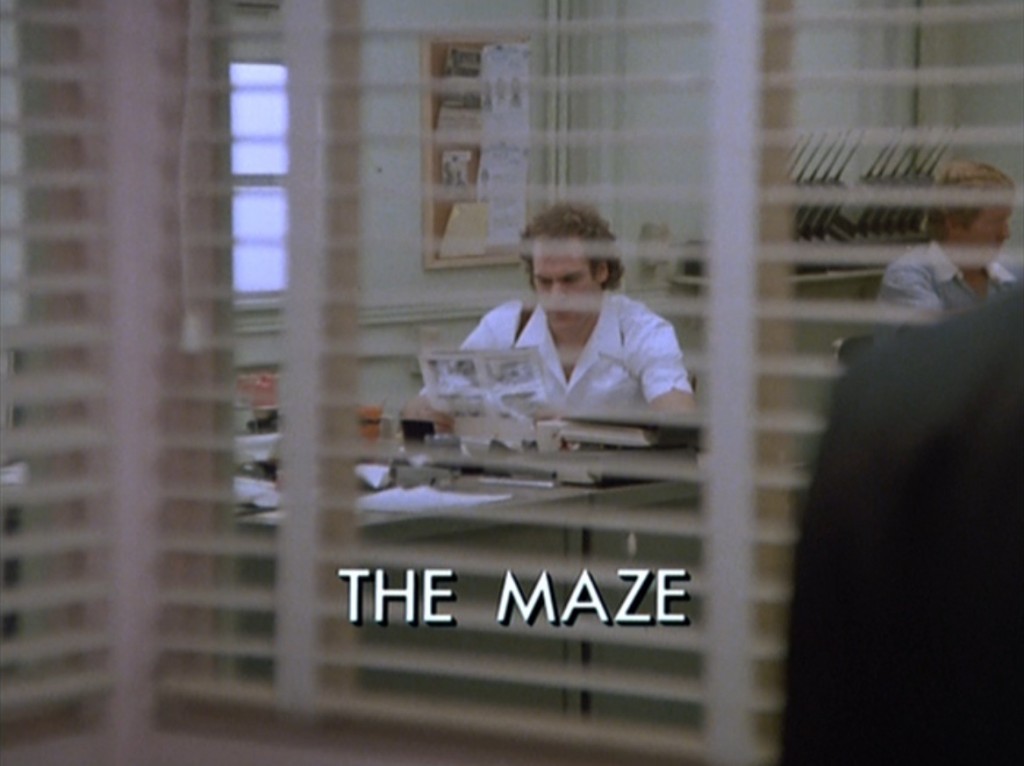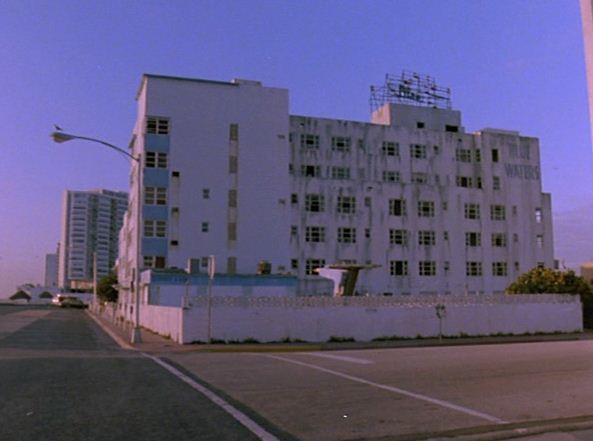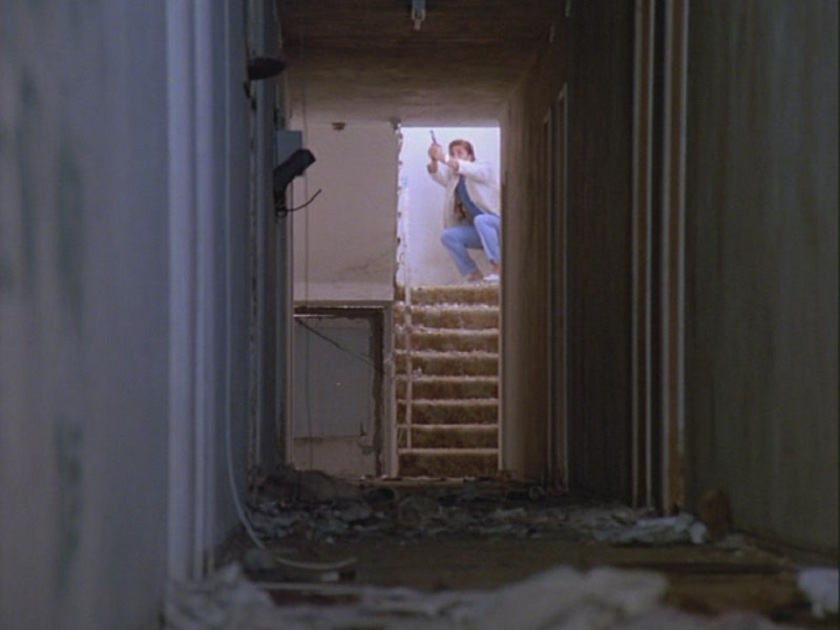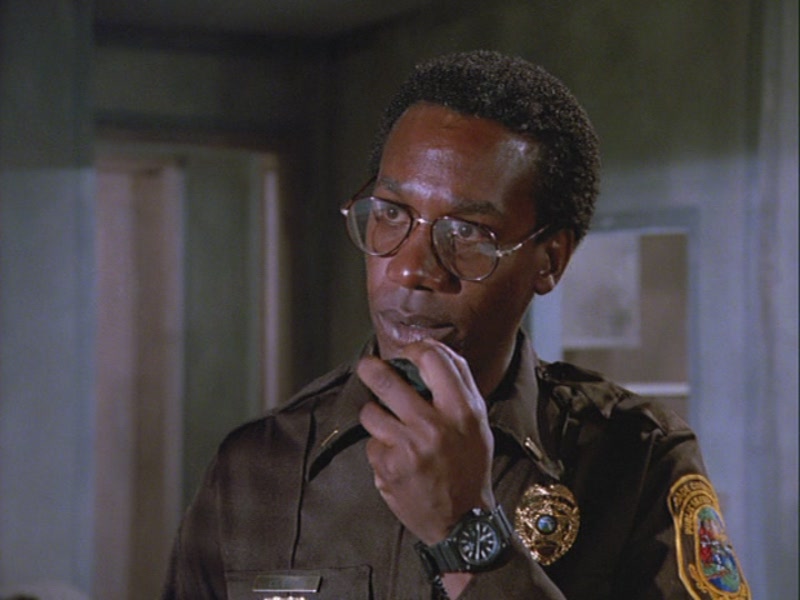For five seasons, Metro-Dade vice squad detectives Sonny Crockett and Rico Tubbs cruised the neon-soaked streets of Miami as soldiers in a seemingly endless war on drugs, guns and prostitution. For Deadshirt, writers Max Robinson and Jake Arant hit the pavement and dig into the very best episodes of Miami Vice.
Episode: “The Maze”
Directed by Tim Zinemann
Written by Michael Eric Stein
Max: This installment of The Virtues of Miami Vice has everything: Psycho teens with nothing to lose. A dilapidated seaside hotel. And hostages. Welcome to…. “The Maze” *montage of flamingos and speedboats begins*
Jake: What a hard-hitting installment of Miami Vice! Crockett and Tubbs get crossways with a cowboy cop after his antics get his partner killed, and the subsequent cop-killer manhunt sees Tubbs trapped undercover in hostage situation in a ruined hotel and Crockett and co. powerless to help him! Max, this episode is the fucking jam.
Max: Jake, I’m going to go as far as to say that this is the best shot episode of Miami Vice, at the very least of the first season. We’ll dig into the hotel in a bit, but I want to talk about the fantastic set piece of the strip mall in the opener. Loved the visual of Crockett leaning around the corner of a jewelry store avoiding gunfire from this week’s villains, a group of sadistic teenagers with high-grade weaponry.
Jake: Oh, absolutely! This scene is a visual powerhouse. Crockett and Tubbs find themselves locked in a tense cat-and-mouse scenario with two desperate cop-killing teenagers, and the pacing is very impressive. There’s a real sense of vulnerability throughout, as we’ve already seen one cop gunned down in pursuit. This is some very tense, well-cut physical stuff that relies on a great backdrop and an excellent soundtrack.
Max: There’s a great moment with this episode’s “shitty cop of the week” Detective Duryea where he’s chasing after the gunmen (who are, again, teenagers) and he doesn’t even flinch when his partner is gunned down. Is the implication here that Duryea is on drugs or something? He’s a great lit fuse for this episode, his totally thoughtless machismo making every situation Crockett and Tubbs find themselves in even worse. He almost shot Tubbs in the hotel!
Jake: Dude, he’s a full-on piece of shit! He absolutely carries that sort of sweaty insano-focus vibe that comes with a drug addict. Every time he flies into a situation, he does so without regard for anyone around him, and his actions during the hotel stakeout are what create the hostage situation in the first place, and they almost repeatedly directly lead to Tubbs getting shot. He’s a great foil to the actual thoughtfulness and professionalism that go into the way Crockett and Tubbs handle things.
Max: Castillo isn’t a huge presence in this episode, but I really dug that he gives Duryea a very restrained passive-aggressive “Hey, do you want to sit this one out?” after he makes a gross joke. The whole sequence of Switek/Zito getting the blueprints to the hotel and Castillo leading the squad through the entry points was excellent, just classic Miami Vice stuff.
Jake: That’s what really wild about this episode! It’s basically perfectly constructed. After Crockett gets a lead on the identity of the killers, we get a great shakedown montage of him rolling through Miami in his Ferrari and hassling his contacts for more info. Much like the previous episode, “Rites of Passage,” this is very much an episode that centers on Tubbs, following his attempt to evacuate the hotel hostages under the guise of a guitar-playing transient.
Max: Special mention to the fucking bizarro dude Crockett and Tubbs interrogate who CANNOT STOP DANCING. “The Maze” is a brilliant episode because half of it is set up and half of it is all set inside the abandoned hotel the gang is holed up in. Remember how I said this was the best-shot episode of the first season? “The Maze” uses long hallway shots and frames of huge empty rooms to create a feeling of both isolation and suffocation for our cast here. We don’t spend much time with the homeless families held hostage in the hotel, but we get a great sense of them in a very short amount of time. The older brother who is ultimately shot dead preventing his sister’s rape, by the way, is a very young Ving Rhames.
Jake: And he is GREAT. This episode really doesn’t have the meandering feel that some of the weaker episodes have. Every bit of dialogue, every shot matters here. A fun part to note, by the way, is that the song that Tubbs sings on his way into the hotel is actually the single that Philip Michael Thomas had just released for his first (failed) record as a singer. Max, something that really appeals to me about this episode is how it’s structured around a critique of the “cowboy cop” trope in general, and how the impulsive, reckless actions of one cop repeatedly drive the stakes higher.
Max: It’s excellent. Duryea isn’t played up as the main villain here or anything, but his actions ratchet up the tension and push Escobar and his cohorts further into a corner. Can’t not mention Joe “Miles Dyson” Morton here as a hostage negotiator, a reasonable guy who is trying to de-escalate a situation that gets worse by the minute. Crockett straight up ignoring his request to hang back is an interesting bit, sort of suggesting Crockett and Tubbs are successful because they’re able to straddle the line between playing it safe and throwing themselves into crazy stupid danger.
Jake: Holy shit, that IS Miles Dyson! I think you’ve hit an interesting point there, Max. Crockett and Tubbs are very much rebellious cops in their way, but they always know when too far is too far, and they never put each other in danger. “The Maze” is such a killer representation of the split-second decision making and occasional dangerous bravado that goes into being one of the show’s Vice Cops. This episode is another great example of Crockett working very well as a supporting player as opposed to a lead, too. I think that part of early Miami Vice’s strength was that it didn’t entirely have what ended up being its winning formula nailed down as religion, and it let them play a little faster and looser with the way they spent their time narratively.
IN TWO WEEKS: “OUT WHERE THE BUSES DON’T RUN”





